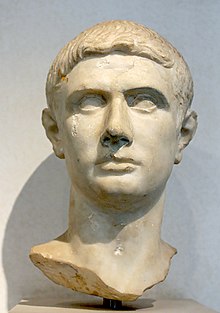 |
Marble bust of Brutus, at the Palazzo Massimo alle Terme in the National Museum of Rome
(Wikipedia)
|
"...and having slightly reproved them for having fallen upon the enemy in disorder without the word of battle or command,he promised them, that if they behaved themselves bravely in the next engagement, he would give them up two cities to spoil and plunder, Thessalonica and Lacedaemon. This is the one indefensible thing of all that is found fault with in the life of Brutus; though true it may be that Anthony and Caesar were much more cruel in the rewards soldiers after victory;..."
(Plutarch 604)
This passage displays the difference between a "good" man and a "great" man. Plutarch is not particularly interested in the moral capacity of his subjects, but thir ability to lead. even though he notes the destruction caused by Caesar and Anthony, Plutarch considers
Brutus to have this major flaw, because he had to make the reward of plunder an incentive for good behavior from his troops, rather than a reward for a job well done.



